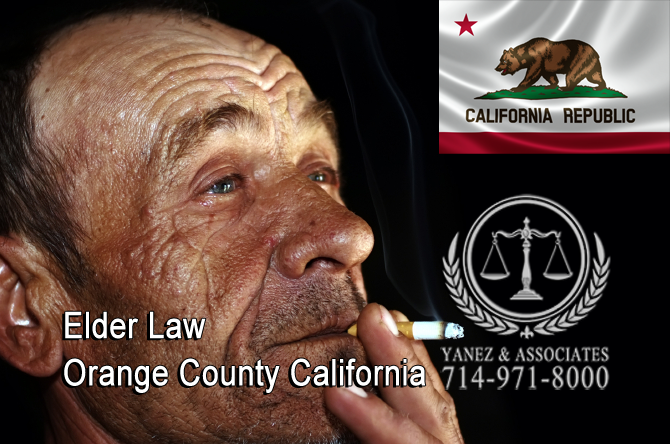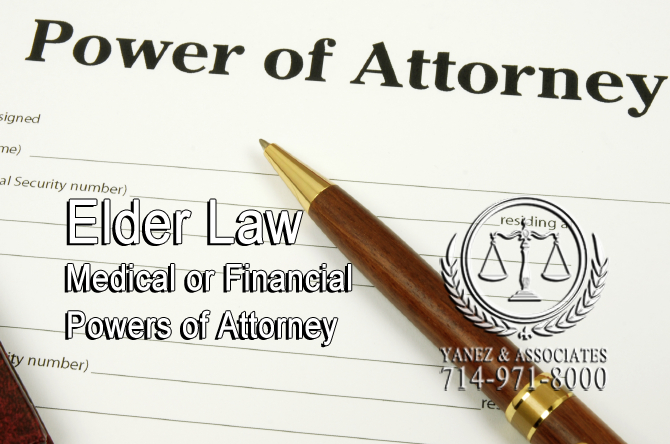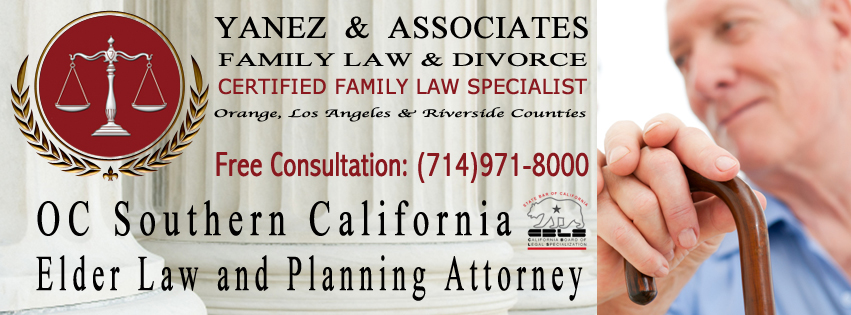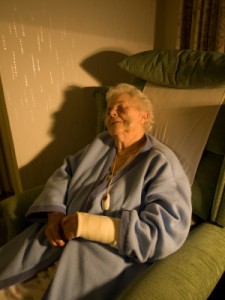Attorney - Elder Law in Orange County, California
Elder law is a broad area of law that encompasses various things that affect the aging population, specifically those who are 65 years old or older. Elder law can include any of the following areas of law:
• Elder abuse, whether in a nursing home, through a financial scam or the abuse of another caregiver or a power of attorney,
• Power of attorney,
• Guardianship,
• Caring for elders, from financial care to paying for a nursing home,
• Estate planning, including wills, trusts, and other planning relating to property, health and finances,
• Medicare,
• Other areas of law that an elderly person may have to take care of.
Elder Abuse in California

Elder abuse is a common occurrence in every city in California; moreover, many individuals are unaware that they are guilty of elder abuse.
Unfortunately, elder abuse is not an uncommon occurrence in California. It is important that we all understand how to recognize possible signs of abuse, and know how to report them to the authorities.
Abuse in a nursing home or at the hands of a caregiver can be among the most difficult to spot. Like other kinds of abuse (domestic violence, child abuse, etc.) the abuser and the victim will both likely try to hide the abuse from outside parties.
Elder abuse by a caregiver can take many forms: physical abuse, financial abuse, emotional or mental abuse, verbal abuse, etc. A caregiver has an obligation to care for an elder, and failing to do so can also constitute abuse.
• Neglect, or failing to provide care for an elder, from food and shelter to healthcare is abuse. Signs of neglect can include anything from sudden weight loss, malnutrition and dehydration to bedsores, illness or injuries that are not addressed and
• Sexual abuse is never okay. Signs of sexual abuse may include bloody or torn undergarments, bruises, scratches, scrapes or bleeding in genital areas, newly contracted sexually transmitted diseases, or a reluctance to be alone with the abuser.
• Physical abuse may seem like the most obvious one to spot, but if the abused person can cover up injuries with clothing or makeup, it may not be. Look for torn or bloody clothing, bed sores, bruises, scrapes or scratches, marks in the shape of objects like a burn the size of the end of a cigarette or a mark the shape of a hand, broken bones, or injuries that do not fit their explanations.
• Financial abuse might be one of the most difficult signs of abuse to spot, especially if an elder is not in charge of his or her own finances, or if you are not. Signs of elder abuse may be odd purchases that the elder cannot use, or ATM withdrawals from ATMs that the elder does not have access to, or unexplained revisions to wills, deeds or trusts. Also look out for signatures that do not match the elder’s signature, or signatures dated after an elder is no longer mentally able to make his or her own decisions.
If you do notice signs of elder abuse, it is important that you report them to the authorities immediately. You may also want to talk to an attorney who works in elder law and elder abuse cases.
Medical or Financial Powers of Attorney

As long as a person is still of sound mind, he or she can legally prepare the papers for financial and medical powers of attorney.
Explain the importance of planning and preparation, but do not force the person to sign anything. Signing these documents is the best way for a person to stay in control of his or her life and decisions in the long run, because they can discuss what they want with the power of attorney now.
If the person is incapacitated and has not signed any powers of attorney, the Court may name a guardian or a conservator, usually a close family member.
A medical power of attorney will name a person to make health care decisions for the elder when he or she can no longer do so, or no longer wants to. The person named in this document is legally obligated to follow the elder person’s wishes when making decisions.
A financial power of attorney gives a friend or family member the authority to handle the elder person’s financial matters. This includes things like sorting mail, paying bills, filing tax returns, tracking investment and retirement accounts, etc. It doesn’t require a financial professional, but it does require a trusted person who has common sense with money.
You can choose to create these documents on your own, or with the help of an elder law attorney. Make sure to keep them in a safe place so that they can be accessed when necessary. It’s a good idea to keep one at home and one filed with your attorney.
Planning Ahead and Making Decisions for an Elder
It is always advised that you plan ahead for your own life while you are young and healthy enough to do so. If you know an elder who has no plan, it is in his or her best interest for you to gently encourage planning.
Even if you are not near 65 years old, it is a good idea to have a will in place, especially if you have children. Wills and trusts can help you prepare for any dependents and loved ones in the case that something happens to you, and you can no longer provide for them. It is also important to update these documents in the case of a major change, such as the birth or adoption of a new child, a marriage or a divorce.
If an accident or death does occur, regardless of a person’s age, and no plan is in place, it falls on California law to determine what happens with a person’s finances and belongings, as well as their debts. It is always a good idea to protect your family with a plan.
Southern California Elder Law and Planning Attorney
In summary, if you are looking to obtain information regarding elder law in Orange County California, or are considering hiring an attorney to assist you with elder law, it is important to first research the topic. It is important to schedule an initial consultation for any clarification you may need prior to retaining an attorney. Before hiring an attorney to assist you with your elder law matter you will want to make sure that you find an attorney that is the best match for you and your family.
Elder abuse is growing throughout society. Recently, elder abuse cases have been on the rise. It is important for all members of society to educate themselves regarding elder abuse and elder care resources. Many communities offer resources to the aging population as well as their caregivers. If you or someone you know is struggling with caring for an elderly individual it is important to help them obtain assistance and support. Resources may include support groups as well as tools to help manage your schedule and reduce daily stresses associated with caring for the elderly.
Signs of elder abuse are often less noticeable if they are not in physical form. Some typical physical forms of abuse can be scratches, bruises, scrapes, or redness of skin. Often times the elderly may not disclose that they are experiencing abuse. Reasons vary as to why the elderly do not report the abuse. It may be because they do not know who they can confide in. In addition, they may fear retaliation from others for reporting the abuse. Everyone can do their part to protect the elderly in our community. If you know someone who is in the elderly community it is important to check in with them weekly and ask how they are doing. Moreover, if you are able to visit them in their current living facility you may observe closely the type of treatment they are receiving.
If you would like to take the next steps toward retaining an Elder Law attorney please call today to schedule your initial consultation. For additional information regarding elder abuse and elder law please contact your local elder law attorney's. Please call Yanez & Associates at 714-971-8000 for your free initial consultation. We look forward to assisting you with your elder law matter.

Regardless of your age, elder law and estate planning can have an effect on your life. Contact an attorney to discuss your current situation, or the situation of an aging loved one, and to see what you can do. At Yanez & Associates, we offer a free initial consultation, so contact us today to schedule yours.














